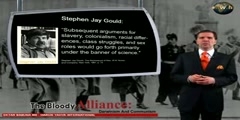Lec 19 - The Romanovs and the Russian Revolution
Lec 19 - The Romanovs and the Russian Revolution. European Civilization, 1648-1945 (HIST 202) The period between the Russian Revolution of February 1917, which resulted in the overthrow of the autocracy and the establishment of a provisional government, and the Bolshevik Revolution in October of that same year, offers an instructive example of revolutionary processes at work. During this interval, the fate of Nicholas II and his wife, Alexandra, was bound up in the struggle for power amongst competing political factions in Russia. Until his death, Nicholas was convinced that the Russian people would rescue him from his captors. Such a belief would prove to be delusional, and the efforts on the part of liberals, socialists, and some Bolsheviks to arrange for a trial would fail to save the czar from the verdict of history. 00:00 - Chapter 1. The Process of Revolution: Political Competition after the February Revolution 10:58 - Chapter 2. Czar Nicholas II, a Family Man 18:39 - Chapter 3. The Father of His People: Narod and the National Family 30:10 - Chapter 4. The Fall of the Romanovs Complete course materials are available at the Open Yale Courses website: http://open.yale.edu/courses This course was recorded in Fall 2008.
Video is embedded from external source so embedding is not available.
Video is embedded from external source so download is not available.
Channels:
Tags: Russian Revolution Romanov czar Bolshevik Menshevik Nicholas Alexandra Kerensky Petrograd Lenin Stalin Trotsky Kadet Russia Soviet Rasputin Marx Peter the Great autocracy Orthodox Church Duma anti-Semitism communism Marxism socialism White Army Red Army
Uploaded by: yalecivilizationeuro ( Send Message ) on 26-08-2012.
Duration: 46m 58s
Here is the next lecture for this course
Lec 4 - Peter the Great
45:43 | 3024 viewsLec 21 - Stalinism
46:47 | 2569 viewsLec 15 - Citizens and Choices: Experienci ...
43:00 | 2089 viewsLec 18- Fighting the Revolution: The Big ...
46:14 | 2682 viewsLec 20 -Constitutional Revolution and Civ ...
49:47 | 2620 viewsTHE BLOODY ALLIANCE: DARWINISM AND COMMUNISM
06:00 | 4900 viewsLec 7 - Russian Formalism
48:57 | 2811 viewsLec 25 - Being an American: The Legacy o ...
41:19 | 2211 viewsLec 11 - Why no Revolution in 1848 in Britain
42:29 | 3019 viewsLec 12 - Why no Revolution in 1848 in Britain
42:29 | 2512 viewsHeart Valve Replacement surgery of a Russ ...
01:20 | 6592 viewsHydrogen Bomb Explosion by Russian Tsar
00:39 | 18053 viewsRevolution of the Probiotics
03:36 | 4872 viewsWildlife Specials the Great White shark f ...
04:56 | 4743 viewsLec 6 - Maximilien Robespierre and the Fr ...
49:57 | 3541 viewsNo content is added to this lecture.
This video is a part of a lecture series from of Yale
















